Alien Cults, Interstellar Wars, and a Starship Murder Mystery: November-December Print Magazines
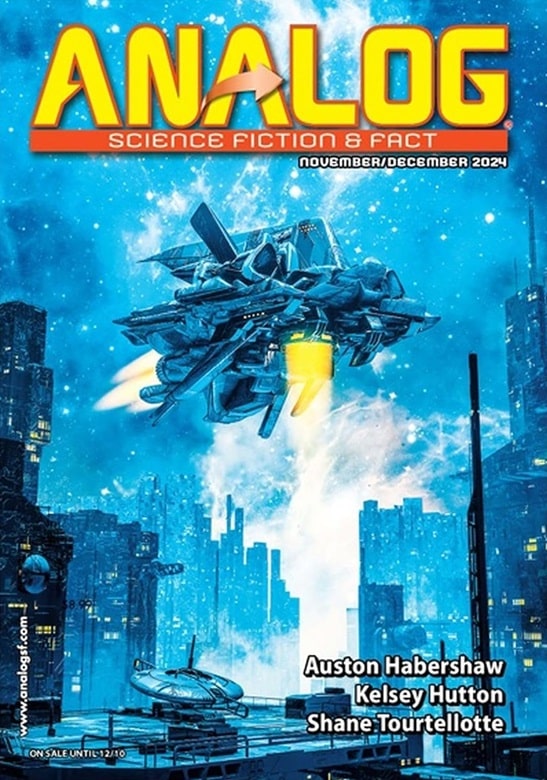 |
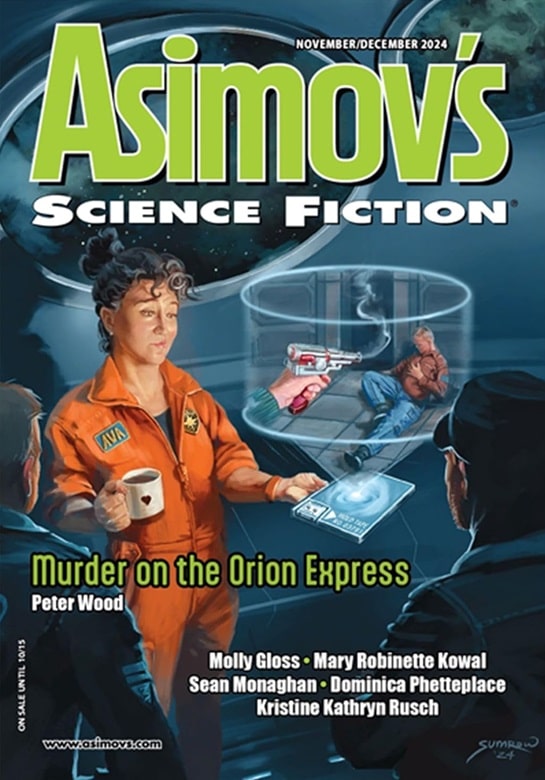 |
November-December 2024 issues of Asimov’s Science Fiction and Analog
Science Fiction & Fact. Cover art by Shutterstock and John Sumrow
We’ve got issues of Asimov’s Science Fiction and Analog Science Fiction & Fact to see us through the dark months of winter, and they’re even more star-studded than usual, with contributions from Kristine Kathryn Rusch, Mary Robinette Kowal, Sean Monaghan, Dominica Phetteplace, Molly Gloss, Jack Skillingstead, Shane Tourtellotte, Sean McMullen, Alexander Jablokov, Jerry Oltion, Mary Soon Lee, and lots more.
The issues contain Rusch’s new novella “Death Benefits,” which Sam Tomaino calls “magnificent… [Rusch] at the height of her powers. It will be on my shortlist for Best Novella Hugo next year;” Peter Wood’s starship murder mystery “Murder on the Orion Express” (“ingenious… a great story”); Jack Skillingstead’s tale of a civil servant in a city beset by war tasked with recording the dead, “The Ledgers” (“Grim”); and David Cleden’s “The Touchstone of Ouroboros,” in which priests of a cult that worships an ancient alien object come face to face with the consequences of their faith, which Victoria Silverwolf praises with “Although some of the mysteries surrounding the object are explained by the end, it remains an enigma. In a sense, it is also a character, albeit one that is impossible to comprehend.”
Sam Tomaino at SFRevu found lots to enjoy in the latest Asimov’s.
The November/December 2024 issue of Asimov’s Science Fiction is here with, 2 novellas, one of them Hugo-worthy, 2 novelettes, and 6 short stories.
The fiction begins with the novella, “Death Benefits” by Kristine Kathryn Rusch.
In a future in which humanity has spread to the stars, the system in and around the planet Vorliss has seen ten years of vicious, endless wars and people have lost loved ones in battle. But yet, many of them think they see their loved ones on the street. They do not approach them or the person denies it. That’s where Davidson Turo comes in. He investigates such cases. We get his story, one of his investigations, and some beautiful, little vignettes about people who lost someone they cared about. Then, everything is brought together for a perfect ending. Rusch is a magnificent storyteller and this is her at the height of her powers. It will be on my shortlist for Best Novella Hugo next year.
“Dreamliker” by Dominica Phetteplace
Zora is a writer of Swamp Girl fanfic for which she relies heavily on AI. She is offered a job at Dreamlike, which produces AI letters from the dead by a fan and takes advantage of it. We follow her on her day and all its ups and downs. It’s a hilarious commentary on internet culture and a lot of other things. A really amusing read.
“Murder on the Orion Express” by Peter Wood
In year fifty of a 125-year journey to Orion of the ship Marie Curie, Ava Martin must investigate the first murder on the ship. If there was a murder. Tape shows Jim Becker, the Explorer Party candidate for Captain in an upcoming election, slamming his opponent, Dennis Rockford, into the starboard bulkhead, firing a photon ray gun at him, burning his body to a crisp, and shoving the corpse out an airlock. There is one problem. All the photon ray guns are locked up. Ava does more investigating, and revives several people, including her ex-fiancée Mildred. her superior, Lieutenant Davenport, and the voyage’s lead astrophysicist, Dr, Sandra Narduzzi, who is now Sister Irene, a Catholic nun. The solution is pretty ingenious and it all makes for a great story…
“The Ledgers” by Jack Skillingstead
Hank Stroud is a civil servant in a city beset by war. His job is to record the dead. He makes sure the job is done. Grim.
The issue concludes with the novella “Wildest Skies” by Sean Monaghan.
Ed Linklater is part of a crew of six on the ship Cumberland orbiting the planet Dashell IV. He is in the ship’s observation nacelle, a coffin-shaped module on the outside when, suddenly, there is a flash from down below. Something comes towards the ship and there is a flash of light. When Ed comes to, it is obvious the ship is destroyed and he is the only survivor. He manages to get the nacelle down to the surface but can’t do anything else. After a while, the nacelle is torn open and he is lifted out. He meets with what are the natives of the planet, bipedal and tall. They seem to be hunter-gatherers with no technology. What took down his ship? He eventually begins to communicate with them and tries to tell them to get him back to the nacelle. They take him on a long walk and he finds something he doesn’t expect.
Great little story, maybe the start of a series.
Read Sam’s complete review here.
The new Analog is reviewed by the always-reliable Victoria Silverwolf at Tangent Online. Here’s a sample.
The novelette “That Far, Uncharted Ocean” by Auston Habershaw opens the issue. The narrator is selected by snail-like aliens to help them win a sailing race on a watery planet, involving multiple species, that lasts for centuries and involves deadly combat among the contestants. The author does a fine job detailing the culture shock experienced by the narrator. The way in which he uses his expertise in sailing, while dealing with aliens who have no experience with large bodies of water, is often witty, without descending into farce. The story will particularly appeal to readers interested in the sport of sailing.
The protagonist of “Lady Ballistic: Fast and Accurate Cleaning” by Alexander Jablokov makes a living by removing infestations from other universes. Her current assignment involves removing huge spider webs from a house about to be sold. Complicating matters is the arrival of hordes of bees that pose a threat to humanity. This quirky tale has a premise that isn’t quite comic, but definitely tongue-in-cheek. The way in which the bees and spiders interact is imaginative, even if it does require a large amount of suspension of disbelief.
“Hell Five” by Arlan Andrews, Sr. features a boy who barely stays alive by stealing technology from the wealthy and selling it to a fence. With the help of the fence and a fellow street urchin, he faces an unexpected future. The story has the slangy, hardboiled style of cyberpunk, which will seem familiar to many. The final two words add an interesting twist, which astute readers may be able to predict from the title.
As its title implies, “The New Saharan Energy Company, Annual Report 2058” by David McGillveray takes place at a time when much of the Sahara is filled with solar panels. The protagonist wanders through the desert with his goats. He inadvertently comes across the scene of a bloody battle, and receives an object containing vital information from a dying woman. Dangerous encounters with the brutal security forces of the energy company follow, then an announcement that will change the world. This short story has the richly imagined setting and thematic complexity of a full novella. The main character is an ordinary fellow who finds himself in a difficult situation, and proves worthy of the challenge. The notion that a benign project to supply clean energy could be corrupted by the greed of those in charge of it is a worthy theme, and the author makes use of it in a mature and sophisticated fashion.
In the novelette “The Touchstone of Ouroboros” by David Cleden, a religious cult worships an ancient alien object. Pilgrims come to touch the thing. If they stay in contact with it for too long, it absorbs them. The main plot deals with a cleric, who is losing his faith, and his superior, who plans to perform a seeming miracle in order to retain his position. Subplots involve the cleric’s confessor and a scientist who wants to study the strange object. Although some of the mysteries surrounding the object are explained by the end, it remains an enigma. In a sense, it is also a character, albeit one that is impossible to comprehend. The story has a dark mood throughout that may not please all readers.
The novella “The Outsiders,” part of a series by Shane Tourtellotte, concludes the issue. Previous stories related how an alien society was devastated by an induced plague, how they recovered over a long period of time, and how they discovered an object that allowed them to track down its source. In this story, their descendants travel to a human colony planet, thought to be the source of the plague. Tense interactions between alien and human eventually reveal the truth.
Despite a dramatic plot, in which the aliens must decide if the humans were responsible for the disaster and, if so, how they should be punished, this is a rather leisurely story. Much of the text deals with the repressive government of the human colony world, and with the interactions among the various crew members aboard a trio of alien starships. (One enjoyable aspect of the story is that the aliens are not all alike, but come from various nations on their native planet, and have different languages and cultures.) I had to wonder if any species would actively seek justice, even for the most destructive act of genocide, after more than a thousand years.
Read Victoria’s detailed review here.
Here’s all the details on the latest SF print mags.
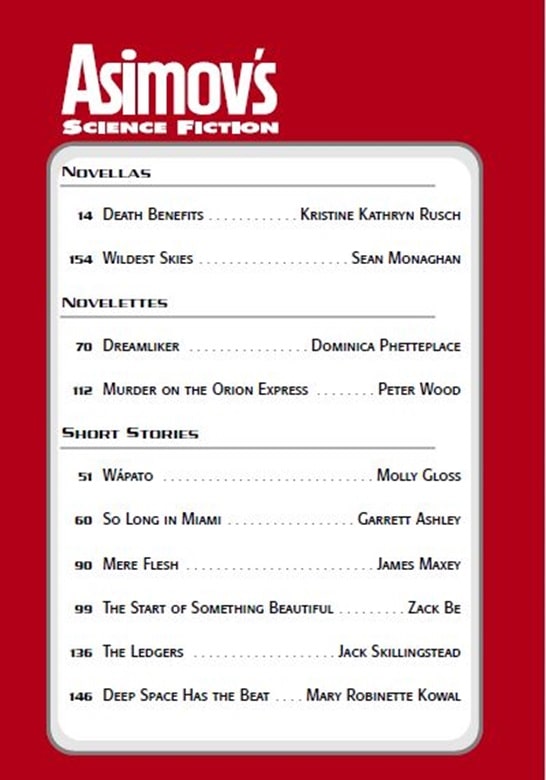 |
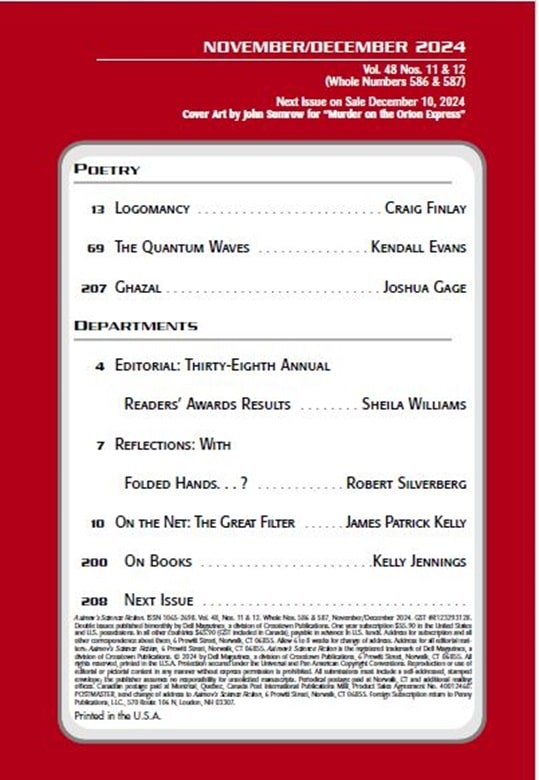 |
Contents of the November-December 2024 issue of Asimov’s Science Fiction
Asimov’s Science Fiction
Sheila Williams provides a handy summary of the latest issue of Asimov’s at the website.
Our November/December 2024 issue ends the year under Sean Monaghan’s “Wildest Skies.” This thrilling novella is filled with adventures on a dangerous and deadly alien planet. In Kristine Kathryn Rusch’s far-future novella, a detective investigates an intriguing mystery and some “Death Benefits.”
Mystery and intrigue can also be found aplenty in Peter Wood’s “Murder on the Orion Express”; Jack Skillingstead’s civil servant exposes the real meaning of “The Ledgers”; spend an exciting evening with Mary Robinette Kowal’s new tale and you’ll discover why “Deep Space Has the Beat”; James Maxie’s character discovers the limits of “Mere Flesh” while searching for his father; multiple truths are revealed in Garrett Ashley’s “So Long in Miami”; a young fan-fiction writer tries to find her place in an oppressive world in Dominica Phetteplace’s “Dreamliker”; Zack Be creates a heart-stopping “Start of Something Beautiful”; and Molly Gloss gives us the beautiful and haunting “Wápato.”
In Robert Silverberg’s Reflections Jack Williamson’s “With Folded Hands. . .?” never seems more prescient; James Patrick Kelly’s On the Net considers aliens and “The Great Filter”; Kelly Jennings’s On Books looks at works by Walter Mosley, Naomi Kritzer, Bogi Takás, and more; plus we’ll have an array of poetry and additional features you’re sure to enjoy.
novelette relates “All the Homes of Terror”; Ray Nayler exposes a bleak truth in “A Gray Magic”; a charming ghost is present in “Art Deco Farmhouse, Original Hardwood Floors, Slightly Haunted” by Alice Towey; “Heartshock” is a deeply disturbing far-future hard SF tale by Nick Wolven; James Patrick Kelly explores the reality of dating a hive mind “In the Dark”; and there is much that is unforgettable about Robert R. Chase’s “Lost Recall.”
Robert Silverberg’s Reflections considers “The Man Who Saw the Future”; James Patrick Kelly’s On the Net reveals “The Music of the Future”; Norman Spinrad’s On Books introduces us to “Citizens of the Galaxy; Kelly Lagor’s Thought Experiment amuses and unsettles us with “Nuclear War, Satire, and the grotesque in Dr. Strangelove”; plus we’ll have an array of poetry and additional features you’re sure to enjoy.
Here’s the complete Table of Contents.
Novellas
“Death Benefits,” by Kristine Kathryn Rusch
“Wildest Skies,” by Sean Monaghan
Novelettes
“Dreamliker,” by Dominica Phetteplace
“Murder on the Orion Express,” by Peter Wood
Short Stories
“Wápato,” by Molly Gloss
“So Long in Miami,” by Garrett Ashley
“Mere Flesh,” by James Maxey
“The Start of Something Beautiful,” by Zack Be
“The Ledgers,” by Jack Skillingstead
“Deep Space Has the Beat,” by Mary Robinette Kowal
Poetry
Logomancy, by Craig Finlay
The Quantum Waves, by Kendall Evans
Ghazal, by Joshua Gage
Departments
Editorial: Thirty-Eighth Annual Readers’ Awards Results, by Sheila Williams
Reflections: With Folded Hands. . . ? by Robert Silverberg
On the Net: The Great Filter, by James Patrick Kelly
On Books, by Kelly Jennings
Next Issue
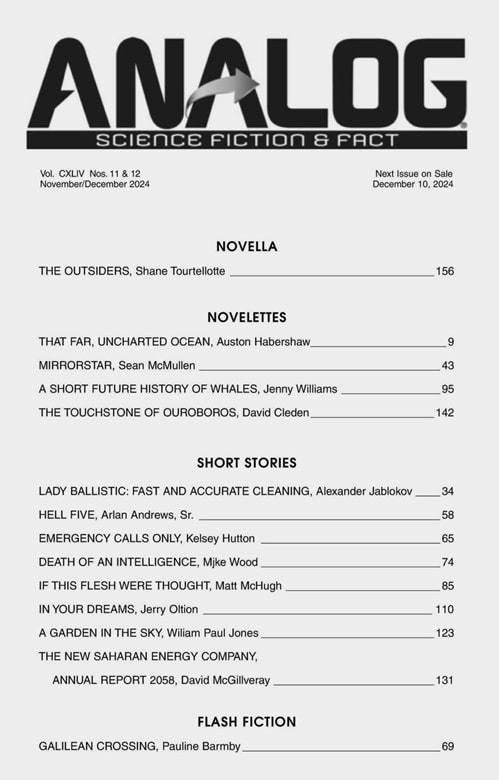 |
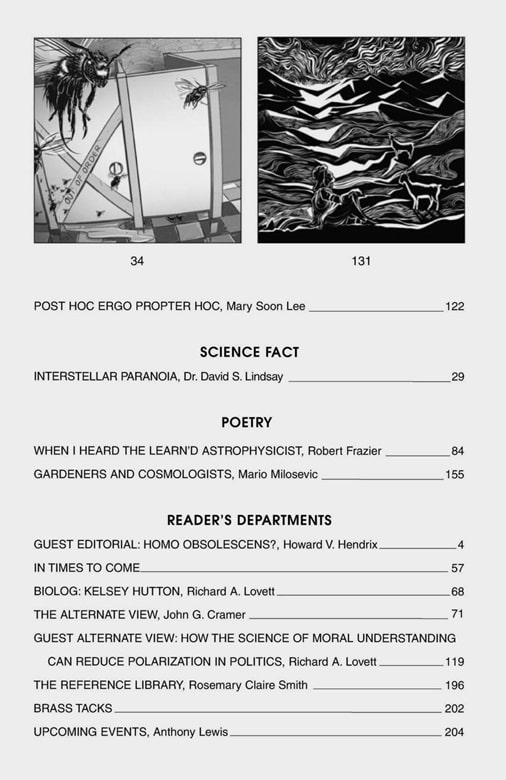 |
Contents of the November-December 2024 issue of Analog Science Fiction
Analog Science Fiction & Science Fact
Editor Trevor Quachri gives us a tantalizing summary of the current issue online, as usual.
We may be talking about what’s coming up in the wintery final issue of the year, but summer is still a few weeks away as I write this at the end of May. Luckily, the stories next issue are great, whenever you read them!
Our lead story has an unusual contest in an even more unusual place, when a human is enlisted to help some familiar aliens learn how to race sailboats in “The Far Uncharted Ocean,” by Auston Habershaw.
Our primary nonfiction piece in the issue is part fact article, part speculative thought-exercise, in David S. Lindsay’s “Interstellar Paranoia.”
We also have the final installment of Shane Tourtellotte’s history of an alien space program (started in “The Malady,” November/December, 2021): “The Outsiders” — all will be revealed! And of course we have much more in store, from Sean McMullen, Kelsey Hutton, Matt McHugh, Jerry Oltion, and others, plus all our regular columns and features.
Here’s the full TOC.
Novella
“The Outsiders,” Shane Tourtellotte
Novelettes
“That Far, Uncharted Ocean,” Auston Habershaw
“Mirrorstar,” Sean McMullen
“A Short Future History of Whales,” Jenny Williams
“The Touchstone of Ouroboros,” David Cleden
Short Stories
“Lady Ballistic: Fast and Accurate Cleaning,” Alexander Jablokov
“Hell Five,” Arlan Andrews, Sr.
“Emergency Calls Only,” Kelsey Hutton
“Death of an Intelligence,” Mjke Wood
“If This Flesh Were Thought,” Matt McHugh
“In Your Dreams,” Jerry Oltion
“A Garden in The Sky,” William Paul Jones
“The New Saharan Energy Company, Annual Report 2058,” David McGillveray
Flash Fiction
“Galilean Crossing,” Pauline Barmby
“Post Hoc Ergo Propter Hoc,” Mary Soon Lee
Science Fact
Interstellar Paranoia, Dr. David S. Lindsay
Poetry
When I Heard The Learn’d Astrophysicist, Robert Frazier
Gardeners And Cosmologists, Mario Milosevic
Reader’s Departments
Guest Editorial: Homo Obsolescens?, Howard V. Hendrix
In Times To Come
Biolog: Kelsey Hutton, Richard A. Lovett
The Alternate View, John G. Cramer
Guest Alternate View: How The Science Of Moral Understanding Can Reduce Polarization In Politics, Richard A. Lovett
The Reference Library, Sean Cw Korsgaard
Brass Tacks
Upcoming Events, Anthony Lewis
Analog, Asimov’s Science Fiction and The Magazine of Fantasy & Science Fiction are available wherever magazines are sold, and at various online outlets. Buy single issues and subscriptions at the links below.
Asimov’s Science Fiction (208 pages, $8.99 per issue, one year sub $47.97 in the US) — edited by Sheila Williams
Analog Science Fiction and Fact (208 pages, $8.99 per issue, one year sub $47.97 in the US) — edited by Trevor Quachri
The Magazine of Fantasy & Science Fiction (256 pages, $10.99 per issue, one year sub $65.94 in the US) — edited by Sheree Renée Thomas
The November-December issues of Asimov’s and Analog are on sale until December 10. See our coverage of the September-October issues here, and all our recent magazine coverage here.